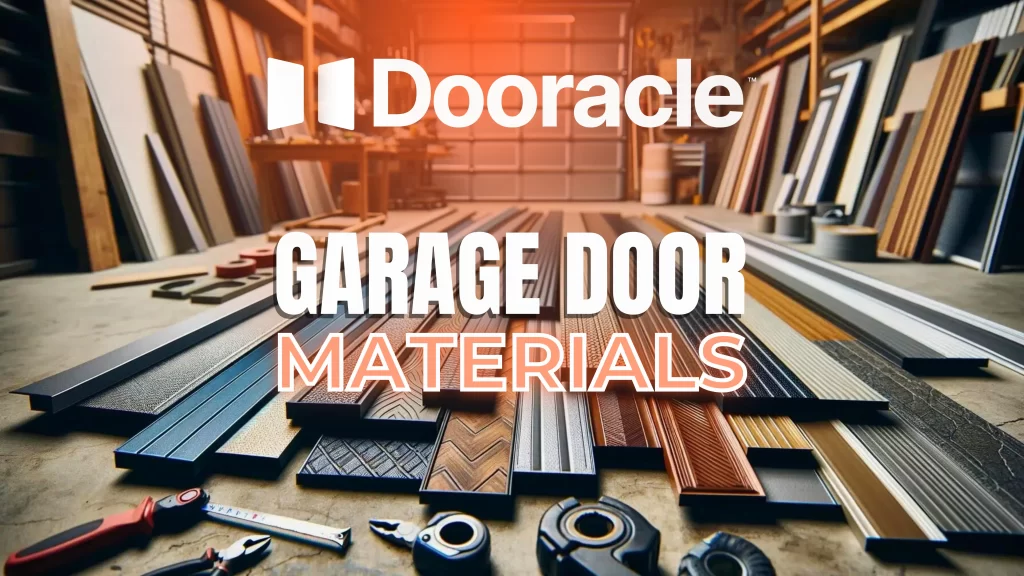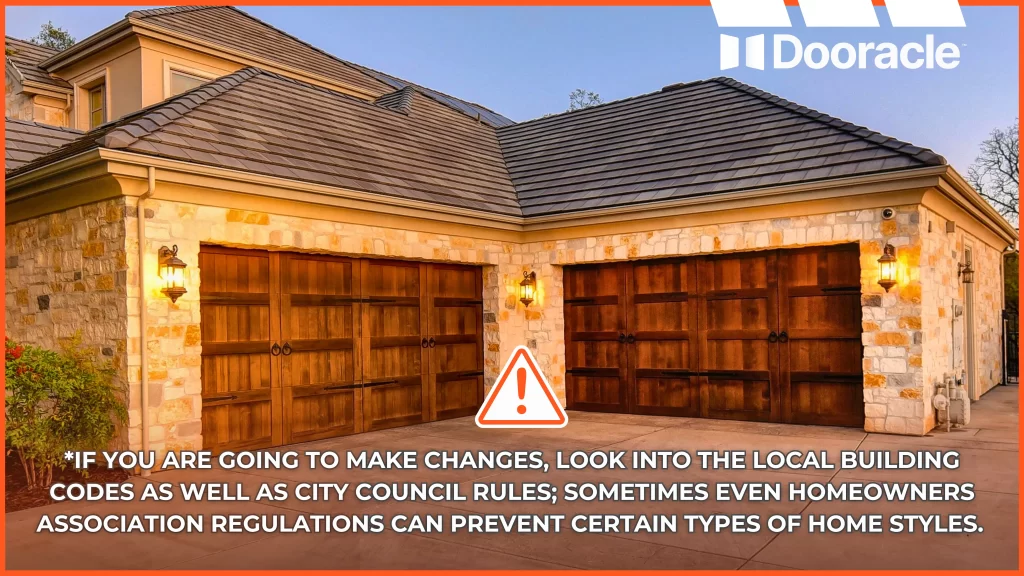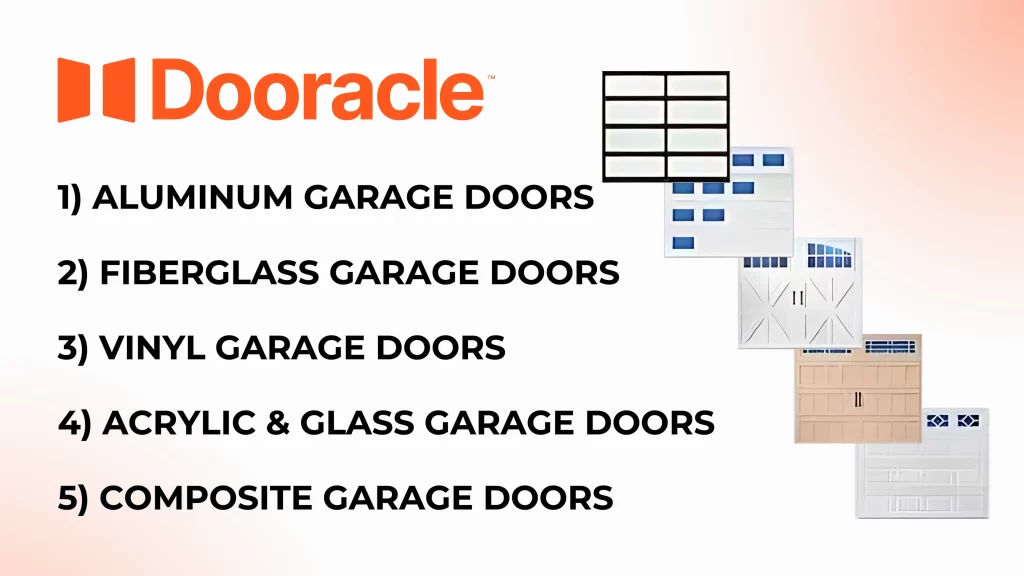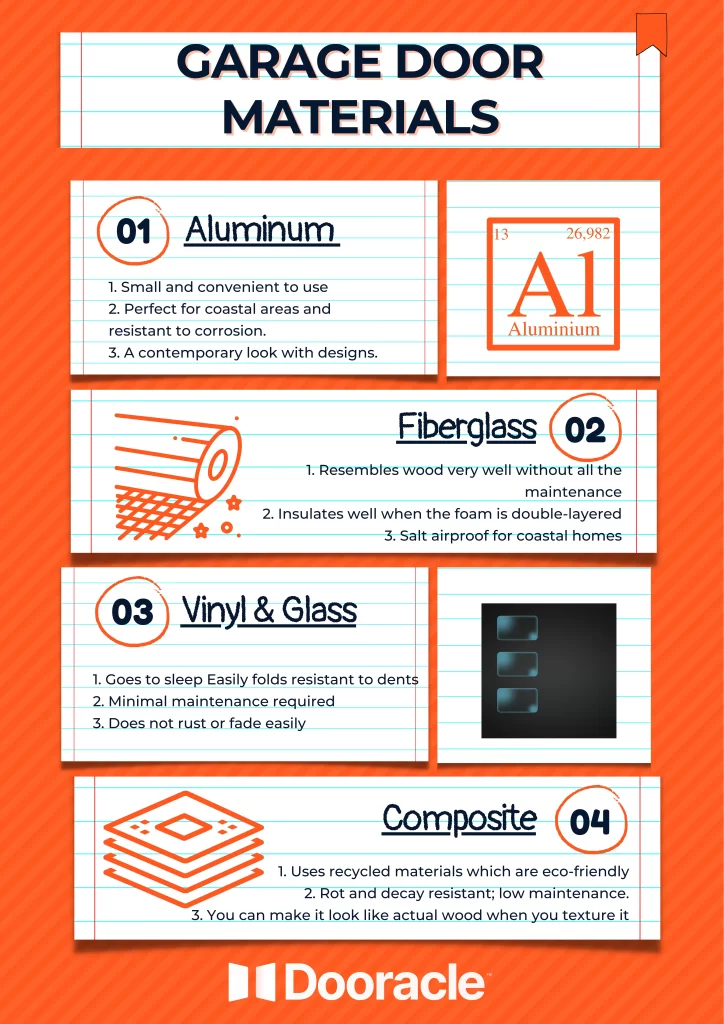Garage Door Materials:
Everything Beyond Wood and Steel
Many types of materials can be used to create a garage door, and it is crucial when building that one acquires the appropriate material because this is what will allow for an aesthetically pleasing home as well as functionality and long life. Wood and steel are the most commonly materials used, but there is a lot more on offer that may be better suited to you. In this complete guide, we will show you some garage door materials that are still super cool to make your decision behind other basic options.

Our guide to Garage Door Materials
The right material for your garage door is crucial to everything from looks to insulating properties and durability. Traditionally, wood and steel are the most common choices because of their structural integrity and beauty; however, new types have emerged that provide additional advantages — such as aluminum (lightweight), fiberglass (durable), vinyl (maintenance-free), or glass.
Aluminum Garage Doors
Aluminum Doors: Aluminum is generally made with two layers of steel; along these lines all the lightweight properties are kept up in comparison to any other door type. Aluminum is not as likely to dent and as a material, it enables designers to use large glass areas for the sleeker more modern appearance cars now feature. It is also one of the favored choices for modern homes as they can be painted in a selection and styles.
-
Benefits
1. Small and convenient to use
2. Perfect for coastal areas and resistant to corrosion.
3. A contemporary look with designs. -
Considerations
1. Admittedly costlier than steel
2. Thin panels can be easily dented.
Fiberglass Garage Doors
Fibrex is a good compromise, and a viable option overall for the many people who want their windows to look like wood without all of the difficulties that come with maintaining real ones. It does not warp, crack, or dent easily. Fiberglass doors work well in rough climates, and they do not rust or corrode.
-
Benefits
1. Resembles wood very well without all the maintenance
2. Insulates well when the foam is double-layered
3. Salt airproof for coastal homes -
Considerations
1. May wear out with exposure to sunlight
2. Cracks in very cold climates.
Vinyl Garage Doors
Vinyl garage doors are made to resist dents, rust, and decomposition. However, they are frequently made with a metal frame for extra support and to extend the life of it. Homeowners seeking a low-maintenance option should look into vinyl, as it is offered in several colors and styles.
-
Benefits
1. Goes to sleep Easily folds resistant to dents
2. Minimal maintenance required
3. Does not rust or fade easily -
Considerations
1. Limited palette and limited texture choices
2. Might be less premium-looking than wood or aluminum
Acrylic & Glass Garage Doors
Glass and Acrylic Glass — glass and acrylic garage doors can make a bold statement for those looking to impress. They are smaller than other windows and can be designed to your chosen degree of transparency when you need natural light without sacrificing privacy. They are typically encased in aluminum to help maintain their shape.
-
Benefits
1. Sleek, contemporary design with lots of natural light
2. Control Transparency & Tinting
3. Insulated Glass Only Means of High Energy Efficiency -
Considerations
1. Not the best price compared to some other materials
2. Can feel invasive and un-tinted
2. Needs clear cleaning on a routine basis
Composite Garage Doors
Cork is harvested, shaved into sheets, and bonded with a resin binder to make composite cork closure plugs. These have the durability of steel and a wooden look but use recycled material nature —-friendly options. Crafted to prevent rot, decay and fungal growth[/custom-specs] See the full overview of how composites are great for wet climates.
-
Benefits
1. Uses recycled materials which are eco-friendly
2. Rot and decay resistant; low maintenance.
3. You can make it look like actual wood when you texture it -
Considerations
1. Costs more than traditional materials
2. Ammonite Materials: These stones are hard to find and have expensive price tags they may also offer limited options in terms of design
Select Material Based on Need
Some of the things you will want to think about when choosing a garage door material are described below.
What it looks like
Select a material that fits well with your home’s style. Glass or aluminum may be the best material for your modern home, but your traditional house probably needs wood—or at least a convincing faux version.
Weather
The material should be appropriate for whatever type of climate you are in. So fiberglass, and vinyl are really good for coastal areas like our sea islands and the upper part of where we have to get into insulated glass or composite doors when you start to talk about extreme temperatures.
Cost
Include the price of the door but also consider future maintenance costs. Other materials may cost more upfront but require cheaper maintenance in the long run.
Terms
How much effort do you want to put into maintenance? The beauty but little upkeep applies to materials widely hardwood as well, however, vinyl or fiberglass will be used.

Conclusion
When selecting a garage door is not just getting wood or steel with many materials to be had. These all have their pros and cons so consider what you are looking for. Armed with the knowledge of features, benefits, and construction elements you will be empowered when choosing a garage door that complements your home and serves your functional needs for many years to come. No matter if you put durability, looks, or upkeep first there is a garage door material that fits right in with your lifestyle and housing design.

